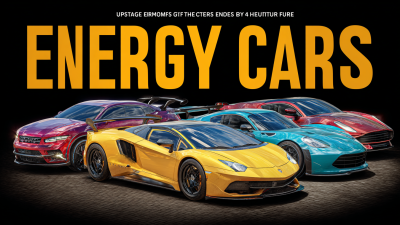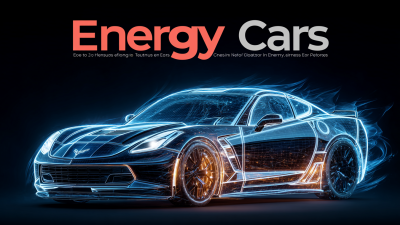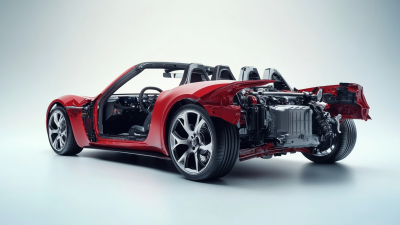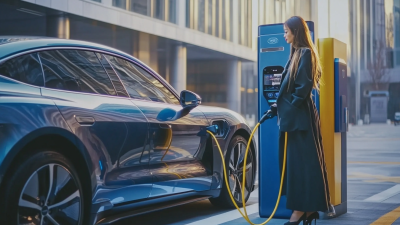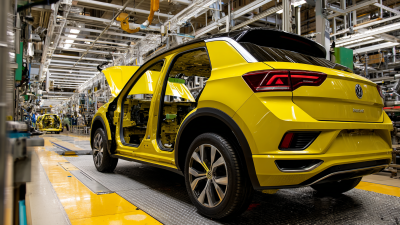Leave Your Message
In recent years, Energy Cars have taken center stage in the automotive industry, heralding a new era of sustainable transportation. As global concerns about climate change and fossil fuel depletion intensify, the demand for vehicles that offer not only superior performance but also enhanced efficiency and reduced environmental impact has skyrocketed. This blog delves into a comprehensive competitive analysis of Energy Cars, exploring their performance metrics, efficiency rates, and cost benefits in comparison to traditional vehicles. By examining various models and technologies, we aim to unveil how Energy Cars are not just an eco-friendly alternative but also a smart investment for the future. Join us as we navigate the evolving landscape of the automotive market, revealing the strengths and advantages that make Energy Cars a compelling choice for today's conscientious consumers.

The landscape of energy cars is evolving rapidly, driven by innovative technologies and changing consumer preferences. Current trends indicate a significant shift towards enhanced performance metrics, where manufacturers are competing not just on features, but on efficiency and sustainability. With advancements in battery technology, modern energy cars are achieving remarkable acceleration and longer ranges on a single charge. For example, leading brands are now introducing electric vehicles (EVs) that can go from 0 to 60 mph in under four seconds, rivaling traditional gasoline-powered cars.
Market positioning is also playing a crucial role in shaping consumer choice. Companies are increasingly emphasizing the dual benefits of performance and eco-friendliness, targeting tech-savvy consumers who seek sustainable alternatives without compromising on power and speed. Additionally, the competitive landscape shows a rise in partnerships between automakers and software companies to enhance the in-car experience, integrating advanced driver-assistance systems (ADAS) that further push the boundaries of what energy cars can achieve. This strategic focus on performance metrics not only strengthens brand identity but also attracts a broader audience eager to invest in the future of automotive technology.
Evaluating energy cars presents a unique opportunity to examine various efficiency indicators that directly impact consumer benefits. Key factors such as energy consumption per mile, battery life, and charging speed play a crucial role in determining a vehicle's performance. For instance, electric cars often showcase superior energy efficiency compared to traditional gas vehicles, allowing drivers to travel further on less energy.
These metrics not only highlight the technological advancements in energy cars but also emphasize their potential to reduce greenhouse gas emissions and fuel costs.
In addition to efficiency indicators, consumer benefits of energy cars are becoming increasingly pronounced. Financial savings from lower fuel and maintenance costs can significantly enhance the overall ownership experience. Many energy cars also come with tax incentives and rebates, making the initial purchase more accessible. Beyond cost savings, the growing network of charging stations facilitates a more convenient driving experience. As consumers become more environmentally conscious, the appeal of energy cars continues to rise, positioning them as a sustainable alternative for modern drivers in search of efficiency and value.
 When it comes to transportation, the shift from traditional gasoline-powered vehicles to energy cars has become a significant point of discussion. The cost analysis reveals a compelling narrative: while the initial purchase price of energy cars may be higher, the long-term savings can be substantial. Energy cars typically incur lower operating costs due to reduced fuel expenses, as electricity is often cheaper than gasoline. Additionally, many governments offer incentives, tax breaks, and rebates for electric vehicle purchases, further enhancing their affordability.
When it comes to transportation, the shift from traditional gasoline-powered vehicles to energy cars has become a significant point of discussion. The cost analysis reveals a compelling narrative: while the initial purchase price of energy cars may be higher, the long-term savings can be substantial. Energy cars typically incur lower operating costs due to reduced fuel expenses, as electricity is often cheaper than gasoline. Additionally, many governments offer incentives, tax breaks, and rebates for electric vehicle purchases, further enhancing their affordability.
In terms of maintenance, energy cars boast fewer moving parts compared to conventional vehicles, leading to lower repair and upkeep costs. Studies show that owners of electric vehicles spend considerably less on maintenance over the lifespan of their cars. Moreover, as battery technology continues to improve, the longevity and efficiency of energy cars are expected to enhance, making them an increasingly viable alternative to traditional vehicles. Thus, the financial implications of switching to energy cars not only support sustainability but also present a smarter economic choice for consumers in the long run.
The evolution of energy cars is undergoing a remarkable transformation driven by technological innovations that enhance performance and efficiency. According to a recent report by the International Energy Agency (IEA), electric vehicle sales surged to 10 million units in 2022, marking a 55% increase from the previous year. This growth can be attributed to advancements in battery technology, specifically solid-state batteries, which promise higher energy density and faster charging times. As manufacturers adopt these innovations, energy cars are expected to achieve a range of over 500 miles on a single charge by 2025, significantly alleviating range anxiety prevalent among potential buyers.

Furthermore, the integration of smart technologies, such as artificial intelligence and machine learning, is poised to revolutionize how energy cars operate. A study from McKinsey & Company forecasts that by 2030, up to 50% of vehicles could be equipped with autonomous driving capabilities, allowing for more efficient driving patterns and reduced energy consumption. These improvements not only bolster the performance of energy vehicles but also provide substantial cost benefits through decreased fuel expenses and lower maintenance costs. As these technologies continue to advance, the future of energy cars looks promising, positioning them as a viable alternative to traditional combustion engine vehicles.
In the rapidly evolving energy car market, competition is intensifying as companies strive to showcase their efficiency and cost-effectiveness. According to a recent report by Bloomberg New Energy Finance, electric vehicles (EVs) are set to reach cost parity with internal combustion engine vehicles by 2025, with the average price for EV batteries falling below $100 per kWh. This pivotal shift is likely to benefit key players like Tesla, which boasts a remarkable range and efficiency, leading the market in terms of miles per charge. Tesla's Model 3 achieves approximately 4.1 miles per kWh, making it one of the most efficient electric cars available today.
Moreover, companies like Nissan and Chevrolet are making significant strides in the energy car sector. A study from the International Energy Agency highlights that Nissan's Leaf and the Chevrolet Bolt EV are strong contenders, offering competitive pricing and efficiency metrics that appeal to a wider audience. Both models provide around 3.5 miles per kWh, positioning them favorably against more expensive counterparts. As consumers become more educated about performance and cost benefits, they're increasingly leaning towards brands that not only prioritize sustainability but also provide tangible savings over time.
